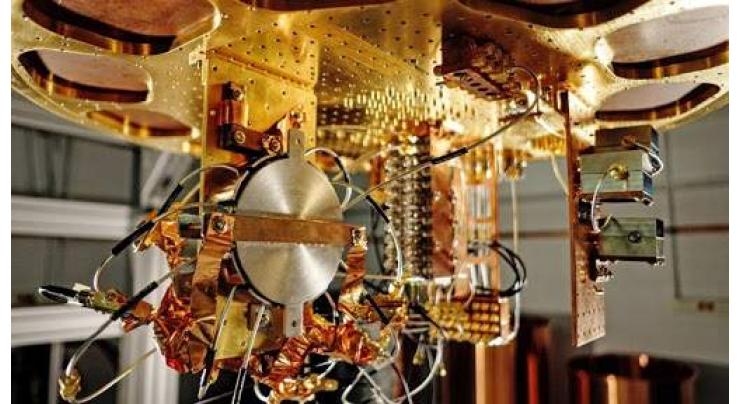
IBM Doubts Russia Capable Of Creating Competitive Quantum Computer - Top Manager
Muhammad Irfan Published February 20, 2020 | 05:00 PM

US tech giant IBM does not yet see Russia and its state nuclear corporation Rosatom as competitors in the field of quantum computers, Arvind Krishna, IBM's senior vice president and future CEO, told Sputnik in an interview
GENEVA (UrduPoint News / Sputnik - 20th February, 2020) US tech giant IBM does not yet see Russia and its state nuclear corporation Rosatom as competitors in the field of quantum computers, Arvind Krishna, IBM's senior vice president and future CEO, told Sputnik in an interview.
In late 2019, Rosatom announced it was launching a project to create a Russian quantum computer. The project's cost was estimated at 24 billion rubles ($367 million).
"Every country has announced [quantum computer] programs. I mean, China announced a $10 billion program. The EU announced I think, 1 or 2 billion Euros. Russia announced that it's going to spend a couple of billions. The UK has announced they are going to spend, the US has announced, Canada has announced. That does not mean that they have the capability to do this," Krishna said, when asked to comment on Rosatom's project.
He said that the creation of a quantum computer required materials, semiconductors and radio-wave electronics, as well as expertise in the field of quantum mechanics, physics and many other disciplines. All this has already inspired changes to education systems, in particular, in the US, he noted.
Krishna also believed that the US was ahead of other countries in quantum computing by a decade, if not more.
"But if I look at some competitors, then I think we are two, three or four years ahead of them.
And I'm afraid that they will catch up very quickly," he said.
IBM's main competitors in the field of quantum technologies are currently Google, Honeywell, as well as Chinese companies that have already tested quantum communication, the top manager said.
Krishna did not rule out that IBM could cooperate with Russia on quantum technologies but noted that this possibilty largely depended on the geopolitical situation.
"I think anything is possible, but I, as you noticed, stay away from geopolitics. Science, unfortunately, depends on geopolitics and export control," he said.
Early last year, IBM announced the creation of the first commercial quantum computer needing just a few seconds to solve complex tasks that would take several thousand years for the most powerful modern supercomputers to solve. Last fall, Google also announced it had created a quantum computer, and had achieved "quantum superiority" when a task set by artificial intelligence was solved hundreds of thousands of times faster than on a common computer. IBM responded by pointing to errors in Google's calculations.
Both companies currently have quantum systems that contain a record of 53 qubits (quantum bits), the smallest elements for storing information in a quantum computer. Russian scientists have so far been able to build a system on only two qubits.
Related Topics
Recent Stories

ICC Womens T20 World Cup Qualifier, Match 2: Ireland Women open with Comfortable ..

Robinson, bowlers help New Zealand go 2-1 up against Pakistan

Shahzeb Chachar to hold khuli kachehri on April 26

Heatwave amid Israel's aggression in Gaza brings new misery, disease risk

Tourism must change, mayor says as Venice launches entry fee

Court adjourns Judicial Complex attack case till May 17

Nasreen Noori’s book ‘Popatan Jahra Khwab’ launched

Wafaqi Mohtasib inspection team visits Excise and taxation office

AJLAC announces 5th Conference titled ‘People’s Mandate: Safeguarding Civil ..

Pak-US officials engage to enhance trade, investment ties

IBCC to promote educational excellence, expand regional presence

Pakistani 'Blue Helmets' serving UN Peacekeeping Mission in DR Congo set to leav ..
More Stories From World
-
Slot 'confident' of Liverpool job as 'negotiations' take place
6 hours ago -
Google parent Alphabet's Q1 profits beat estimates: company
6 hours ago -
WADA asks 'independent prosecutor' to examine Chinese swimmers case
6 hours ago -
New York court overturns Harvey Weinstein sex crime conviction
6 hours ago -
Bagnaia and Spanish rivals chase victory at Jerez
8 hours ago -
Russian, Ukrainian strikes kill at least 10 in frontline regions
8 hours ago
-

Heatwave amid Israel's aggression in Gaza brings new misery, disease risk
8 hours ago -

Tourism must change, mayor says as Venice launches entry fee
8 hours ago -

Pakistani 'Blue Helmets' serving UN Peacekeeping Mission in DR Congo set to leave after 20 years of ..
9 hours ago -

Putin says plans to visit China in May
9 hours ago -

US reinstates open internet rules rescinded under Trump
9 hours ago -

Honda announces US$11 bn EV battery and vehicle plant in Canada
9 hours ago





